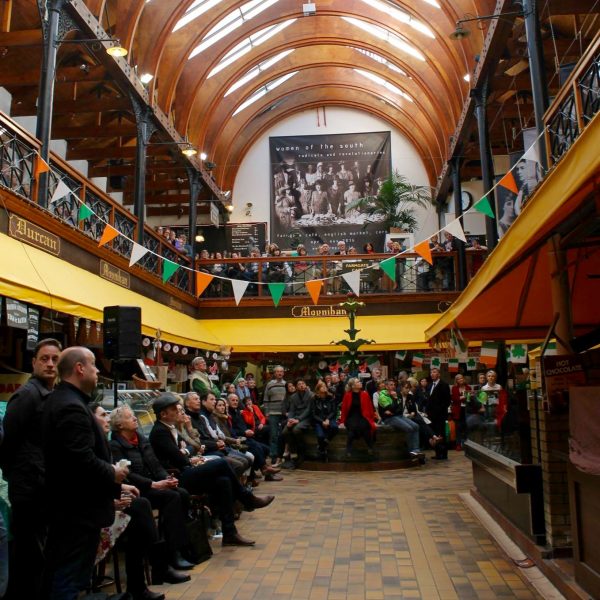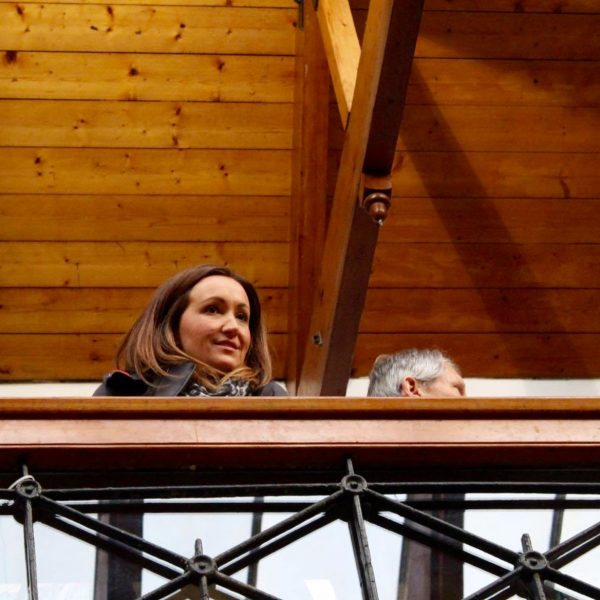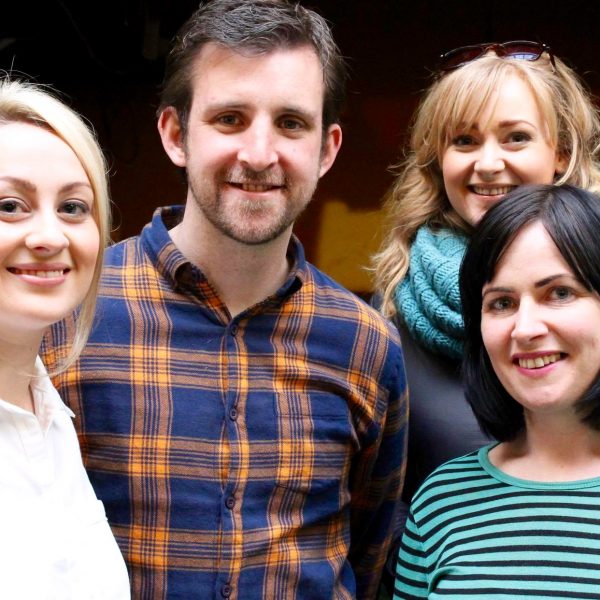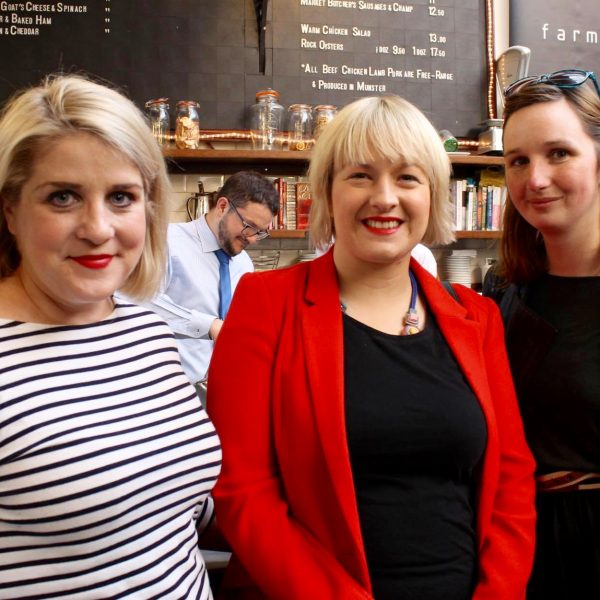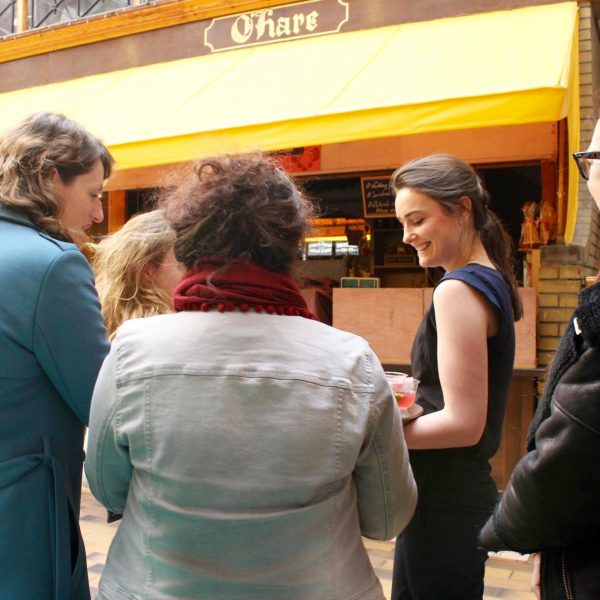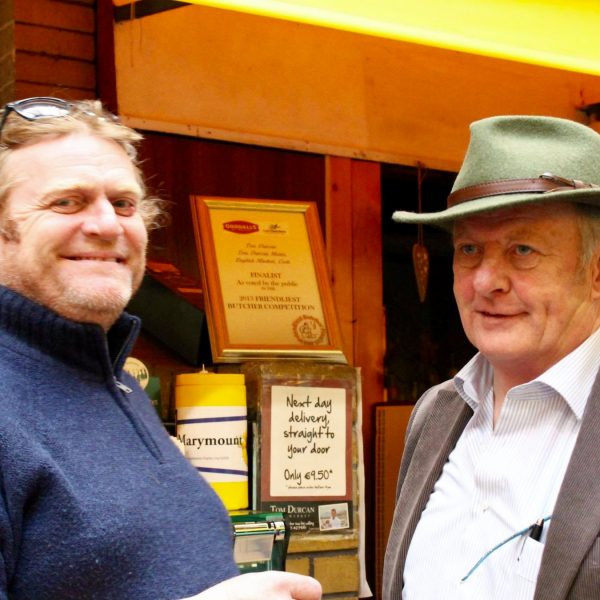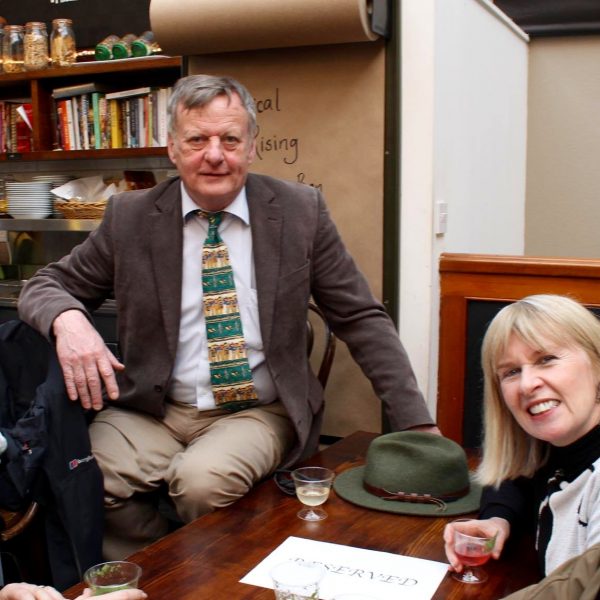The Lost Voice in Irish Revolutionary History
The second event of the ‘Women of the South’: Radicals and Revolutionaries series presented Sunday Times journalist and writer, and native of Bandon, Justine McCarthy, who spoke about women’s role and lost voice in Irish revolutionary history.
The evening incorporated a series of performances of original speeches and witness statements, which vividly demonstrate, in their own voice, the active role the women of Munster played in the period of the revolution, through suffrage, trade unionism and nationalism.
Introduction to the Exhibition
Introduction to the evening and exhibition by Prof. Linda Connolly, followed by Dr. John Borgonovo introducing the banners of Kathleen Clarke, May Conlon, and Mary MacSwiney; and Dr. Sandra McEvoy introducing the banners – Susanne Day and Hanna Sheehy Skeffington.
The Bureau of Military History
The Bureau of Military History was an oral history project that interviewed veterans of the independence movement of 1913 – 1921. It is a rich source for the recovery of women’s lives during this turbulent period. The first three readings below are witness statements collected by the bureau and now available online.
Nora Daly Dore
Witness Statement performed by Niamh Linehan
The first witness statement is from Limerick woman Nora Daly Dore, sister of Kathleen Clarke, who is represented on one of our banners. The history of Cumann na mBan in Limerick is inextricably intertwined with the history of the Daly family. They dominated the organisation in Limerick. Madge Daly was the President of the provisional committee of Cumann na mBan in the city. Laura Daly was also a member of the committee. Madge served as President for almost all of the period from initiation in 1914 until disbandment in 1924. As well as Madge and Laura, their sisters Kathleen, Agnes, Caroline and Nora were all heavily involved. The activities of the branch revolved around the Daly women and their home. Nora’s witness statement, recorded on 19 September 1948, recounts her journey to deliver verbal instructions to Cork on the 1916 Rising.
Nora Daly Dore witness statement (Limerick, 9 September 1948)
Between midnight and one a.m. the second day of the rising I was asked if I would try to get out of the city (Dublin) and make my way to Cork to deliver a verbal message to Terry McSweeney. The message was: — “Tell Terry McSweeney we are in action and we know he will follow us”. I agreed to try and with my sister who was asked to go to Limerick we left the General Post Office under the guidance of Eamonn T. Dore, who was to get us through the British “lines” and to Kingsbridge. There was a train waiting to take “refugees” (people who had come to Dublin for the Bank Holiday and got held due to the Rising). The train was to leave at 6 a.m. and just on time our guide had us there, though on the way he was held four or five times for questioning. Nobody was allowed into the station unless he or she was the holder of a return ticket. We had on us two return tickets for Limerick, and got on the train with those. Having seen us into the station our guide left us to try to get back to the General Post Office to report the success of the first part of our journey. Months later we were to learn he succeeded.
When we were well out from Kingsbridge there was a check of tickets, and after much fumbling I told the checker I had lost my return ticket for Cork. He knew I could not have got on the train without a return ticket, so he very kindly, much to my delight, took particulars, issued me a pass to Cork, for which I payed. My sister parted with me at Limerick Junction and I with my “Pass” went on to Cork and disappointment. The only address I had was McSweeney’s private address. I drove there to find from the people next door that they were away in the country. On the advice of the neighbour I left my bag with some people who lived across the road from McSweeney’s. I then started for the city to try and find there the Volunteer Headquarters. The city was full of military and I was afraid to ask anyone for information. I rememebred I heard of a Limerick girl who worked at Thompson’s Confectioners. I found her but she did not know where the Volunteer headquarters was, but told me where a Volunteer officer—Sean Jennings—had a shop. I went there to find he was at a friend’s house. I found it after much trouble. He had been married that morning. He sent me back to his shop and told me to wait there and that he would send a boy scout to take me to see Terry McSweney at headquarters. This boy scout took me to the Volunteer H.Q. and there I met Terry McSweeney, R.I.P. and Tomas McCurtain, R.I.P. I told them what had been done in Dublin and that Sean McDermott sent me to deliver a verbal message “Tell Terry McSweeney we are in action and I know he will follow us”. They both seemed to think Dublin was wrong and they were right. They said they had documents to prove they were right. In the course of discussion I told them I did not know why Dublin decided to go out on Monday but whatever Tom Clarke and Sean McDermott did was right in my eyes. They said they would wait until they were attacked as they were not in a position to attack. That they would not give up their rifles. The Bishop of Cork, Dr Coholan had been in with them a couple of times asking them to give up their rifles to him. When I was leaving after delivering my message and listening to their reply, they asked me to come back in the morning and take a message to Limerick. Just as I was leaving I met Mary McSweeney (she had been from home) and she took me to her house for the night. I went with her to see them again in the morning but they said they had decided to send a messenger of their own to Limerick, as she could bring them back an answer. I left with Mary McSweeney and we were followed by two policeman. She took me to her house where I changed my costume, the better to escape notice, and going out by another door, got to the railway station where I found all Dublin bound trains were stopped. I had intended trying to get back to Dublin to report my failure with Terry McSweeney and Tomas McCurtain. I took a train leaving for Limerick thinking to get to Dublin from there, but again failed.
I have said that the only decision I could get out of Terry McSweeney and Tomas McCurtain was that they would not give up their arms. Before I left Cork on Thursday I heard they had actually handed them over to Bishop Coholan.
The reason I was selected to go to Cork was, the message being verbal, the messenger would have to be known to Terry McSweeney. I and my family were well known to the McSweeneys.
Signed: Nora Daly Dore
Peg Duggan
Witness Statement introduced by Aisling Reardon and performed by Katie Murphy
Cork native Peg Duggan lived at 49 Thomas Davis Street joined Cumann na mBan in 1913, as soon as it was established in Cork, and remained active in the cause of Ireland until 1921. Peg and her sister Annie sold flowers, initially in a shop that was closed by police in 1919, and later at a stall at Cornmarket Square. Annie Duggan established the Clann na Gael republican girl guides in Cork; while her other sister Sarah, a seamstress, was president of Cumann na mBan’s Cork District Council. The following are excerpts from her lengthy witness statement, recorded on 14 February 1957, which covers the period from 1913 to 1921. Peg Duggan served as captain of the Tomás Ceannt branch of the Cumann na mBan which encompassed the Blackpool area and was treasurer of the Prisoners’ Dependents Fund, Cork.
In 1913, when the Cumann na mBan was established in Cork, I and my sisters joined. At a later date I was appointed to the post as captain of the Cork Cumann.
The Cumann organised ceilis and concerts for Volunteer funds. I remember we organised an excursion to Bantry on one occasion by way of a cover for Volunteers who were collecting guns on the Cork coast.
When PH Pearse reviewed Volunteers in Limerick City in, I think, 1915, I went with a party of the Cork Cumann na mBan. After the meeting, on our return to the railway station at Limerick, we were attacked with stones, sticks, and bottles by the pro-British (ex-soldier) element in Limerick,
I, with members of the Cork Cumann, also went with a contingent of Cork Volunteers to the funeral in Dublin of O’Donovan Rossa in August 1915. I took a wreath and was at the graveside where I heard the famous oration given by PH Pearse.
On the Sunday of Easter Week 1916, the Cumann na mBan were aware that ‘the boys’ were going on a route march to the country, but we got no instructions to accompany them. I do not know that the boys did return to Cork City later that Easter Sunday night.
On Monday night, I went to An Grianain, but got no instructions. I reported there each night, but there was nothing doing. Next we heard of the surrender of the Volunteers’ guns to the Lord Mayor (Butterfield). Not all of the Volunteers agreed to hand up their guns. We took away some of the arms of those who refused to surrender them and kept them in safekeeping. There was no military action taken by either the Cork City Volunteers or the Cumann na mBan during Easter Week 1916.
It was, I think, about the month of November 1916, or perhaps early in 1917 when Cumann na mBan was declared an illegal organisation by the British authorities. Following this announcement, a special meeting of the Cork Cumann was called. Mary McSwiney addressed the meeting and put it to the members to decide whether we should carry on, in view of the fact that our organisation had now been declared illegal and members would be liable to arrest and imprisonment. The vast majority of those present decided to carry on under the name Cumann na mBan, Craobh Corcaigh.
As activity against the British forces increased, and many Volunteers had to go ‘on the run’ to escape arrest, it was the job of Cumann na mBan to provide for these men, either in the homes of Cumann na mBan or in houses of ‘reliable’ sympathisers. I might state here that my own home in Thomas Davis Street, Cork, was a regular hide-out for men ‘on the run’ with the result that it was raided by police (one of many raids by police and military subsequently) and my sister Sarah arrested. She was sentenced to a month’s imprisonment in Cork Gaol. Countess Markievicz was also in Cork Gaol at that time, along with Cumann na mBan girls from Killarney and elsewhere.
It may be of interest to record my recollections on the night of 20th March 1920, when Tomas McCurtain was murdered by British forces in his home in Blackpool. My own home is almost directly across the road from the McCurtain’s house.
On the night in question we went to bed and noticed the gas lamps being put out. This fixed the time at about 12:30 a.m. Very shortly afterwards, we heard a thundering knock at a door, followed by shots up and down the street. My sister Annie and I jumped out of bed and put on coats over our night attire. We met Rev Father Burts [who] told us he had got a phone message from McCurtain’s to say that Tomas had been shot. The priest, my sister Annie and myself arrived at McCurtain’s in a very short time and were met by Mrs McCurtain. Father Burts heard Tomas’s confession on the stairs landing. Tomas was lying there where he was shot, but was conscious. We were present while he was being anointed and, after the anointing, he died where he lay. An ambulance arrived and the men lifted the remains onto a bed.
We all knelt by the bedside to say the Rosary when a party of British military arrived, accompanied by uniformed RIC. The military and police searched every nook and cranny in the house, even to the bed on which Tomas lay dead, but they found nothing. Before leaving, they disclaimed all knowledge of what happened.
During the hottest period of the fight my home was a constant rendezvous for IRA men. Plans were prepared (in our house) for ambushing of British military and police, e.g., the Whitecross ambush of 2nd August 1920. Following another ambush at Blackpool, our home was again raided by military and my father was taken out to be shot. He was, fortunately, released. My brother was arrested in another raid on out house and sent to prison on Spike Island.
I and my sisters devoted every spare moment of our time to harbouring wanted men, carting ammunition and guns for the IRA, visiting prisoners in jails, providing comforts for them, carrying dispatches and, in general, assisting by every means in our power in the fight for freedom. We were engaged in these activities when the truce of July 1921 came.
Muriel MacSwiney
Witness Statement introduced by Niamh Linehan and performed by Aisling Reardon
The last witness statement is from Mrs Muriel MacSwiney, originally a Murphy. Her family owned the Midleton Distillery in Cork while another branch of the family ran brewing the Murphy’s brewery. At the time of her writing of this witness statement, October of 1951, she was the widow of Terence MacSwiney, famous lord mayor of Cork who died on hunger strike in 1920 in Brixton prison. The lengthy witness statement includes memories of Terence, including his death in prison. The excerpts recorded in the video above detail the events leading up to Muriel meeting her future husband in 1916.
Mrs Muriel MacSwiney, Witness statement:
I was seventeen when I left my snobbish convent school at St Leonard-on-Sea where I learned nothing except to be a lady, which I never became. My family, of course, were completely imperialistic, conservative, capitalistic and Roman Catholic, and these were the ideas that were instilled into me and carefully fostered. I think it was reading Sinn Féin and Irish Volunteer newspapers was what turned my mind away from the ideas favoured by my family, It was in Liam Russell’s shop in the Grand Parade that I got these papers. You met everybody there. He was a Volunteer, and all the heads of the Volunteers, Tomas McCurtain, Seán O’Sullivan, Liam de Róiste and occasionally Terry MacSwiney used to be there. There was another little newspaper shop kept by two sisters, the Misses Wallace, later connected with the citizen army.
The first national occasion at which I was present was a public meeting in memory of the Manchester Martyrs at the Grand Parade in Cork in the autumn of 1915. It would be about the end of 1915, I imagine, that I became actively interested in the national movement
I became a member of Cumann na mBan either in the end of 1915 or the beginning of 1916 and attended the meetings at different places. I used to visit the McSwiney’s house in Victoria Road. As far as I can remember, Mary McSwiney was the President and Miss Nora O’Brien, who had a hat shop, was Secretary of Cumann na mBan.
A short time before the Rising I was in Dublin and I must have had a message for Terry, because I waited for him in Parnell Square outside the Gaelic League offices and after giving him whatever message I had, I asked him was something going to happen and he said “Any day”.
We all knew that the Volunteers marched out to the country Easter Sunday, taking two days’ rations with them. They came back some time on Monday, I cannot remember when. Although I came from such a frightful family, the Volunteers always treated me very well and trusted me, even Sean O’Hegarty who was a very suspicious man. I afterwards learned that Terry distrusted me before he met me because of the family I came from; he was right.
Susanne Day
A reading performed by Aisling Reardon
Susanne Rouviere Day (1876-1964)
Susanne Day was a Cork suffragist and writer and the first Hon. Secretary of the non-militant Munster Women’s Franchise League (MWFL). She was the youngest of the eleven children of Robert Day, a businessman, archaeologist and antiquarian, and aformer Alderman of Cork, and his wife Rebecca Scott Day.* She was proud of her Huguenot ancestry.
Susanne was a dynamic organiser and with fellow MWFL committee members put huge energy into expanding the organisation across the province so it had branches in places like Skibbereen; Limerick; Waterford; Nenagh; Tralee and Valentia and it organised meetings in many towns across Munster.
Susanne boasted that in its heyday the MWFL involved women of every shade of political opinion, as she put it ‘intense Unionists and Sinn Feiners’ – and Mary MacSwiney was a founding member and served on its committee until a row arose in late 1914.
For Susanne, suffragism involved looking at social issues from a woman’s perspective. One of her plays of this period, Toilers, brought home the relationship between low wages for women and prostitution. It was performed by the Irishwomen’s Reform League in Dublin in 1913 and by members of the MWFL in Cork in March 1914.
Her pamphlet Women in the New Ireland looked forward to a home rule parliament in which women shared political decision-making and it inferred that they were better equipped than men to identify and address social problems such as:
stifling dens in squalid streets, where human beings are herded as a farmer would herd his cattle; … little children unable to profit by the education offered to them because their bodies are pinched with starvation; … they [women] see disease decimating whole families; they see Workhouses eating like cancerous sores into the very heart of the people; they see breweries flourish while breadwinners drift into Asylums or Jails; and they see little children of tender years working as “half-timers”.
One of the MWFL’s first projects was to support four women candidates in the 1911 Cork Poor Law Guardian elections to the board that ran the workhouse – the first political position open to women in the city. Susanne and her constituency running mate Hanna Mary Barry (a widowed mother of eight and ‘proprietress’ of a plumbing business) topped the poll in the North East ward and then issued a statement emphasising that they had stood ‘solely in the interest of the poor,’ something they clearly considered set them apart from other candidates.
Susanne’s best known work is her 1916 novel The Amazing Philanthropists: a sharp eyed, ironic and funny but only slightly fictionalised account of her struggle as a woman Poor Law Guardian to bring about common sense reforms in the workhouse. She exposed petty local politicking, nepotism, and the crying need to abolish the workhouse system. She was also the first woman to stand in a Cork city municipal election in January 1914, missing a seat by 6 votes. As a suffragist, she stood as a non-party candidate but she was pro-home rule and thought a Dublin parliament would give women the vote and work with them on social reform.
Both Susanne’s parents died in the summer of 1914 and she stepped down from the committee of the MWFL soon after, though that was intended to be a temporary move. In December 1914 and January1915 Susanne spoke at meetings in Dublin and Cork saying that the war in Europe was an evil that women must work to end. In early summer 1915 she joined a Quaker relief unit in France working to support civilians – largely women, children and the elderly – displaced when their homes became battlefields. She chronicled their stories and her experience as a relief worker in her book, Round About Bar-le-Duc. (An unpublished manuscript by Day, St Martin’s Cloak (dating from around 1933) contains some further detail of her war experience and is held in the Cork City Library, Grand Parade.)
Susanne’s vocation was writing and theatre was her great love. Her short play Out of the Deep Shadow formed part of a double bill at Cork Opera House in 1912 and two plays she co-authored with friend and fellow MWFL committee member Geraldine Cummins, were performed by the Abbey Theatre company: Broken Faith (a 2 act drama), in 1913, and Fox and Geese (a 3 act comedy), in 1917. Some of Susanne’s later plays are in the Geraldine Cummins papers in the Cork City Archives and a couple of these were performed at the Gaiety Theatre in Manchester.
After the battle of Verdun ended in December 1916, the kind of relief work required in Susanne’s sector changed somewhat, with a greater focus on agriculture projects. When she left France early in 1917 she went to London to carve out a career as a journalist – no easy job for a woman at the time and an indication of her determination to make her own choices.
From 1917-1921, Susanne edited The Englishwoman, a highly respected suffragist journal and her work can be tracked in a range of Irish and British publications during the 1920s, including the Yorkshire Post and the Daily Telegraph and in 1933 her book Where the Mistral Blows was published.
London was Susanne’s home from this period and she played no further part in Irish women’s politics, though correspondence between writer Edith Somerville (who was president of the MWFL) and Sir Horace Plunkett suggests that Somerville recommended Susanne as a suitable delegate to represent the women’s movement at the Irish Convention (convened in 1917 to address constitutional issues). Plunkett, who was chair of the Convention, appears to have put Susanne’s name forward but she was not accepted (see Otto Rauchbauer (1995) The Edith OEnone Somerville archive in Drishane: a catalogue and an evaluative essay (Dublin: Irish Manuscripts Commission), p. 208).
Susanne Day died in Cromer, in Norfolk, in 1964.
*On Susanne Day’s family see: Margaret Lantry, Robert Day: businessman and antiquarian, in Journal of the Cork Historical and Archaeological Society, Robert Day Centenary Volume, 119, 2014, pp. 1-22.
Women in the New Ireland, Susanne R Day
Many signs point to the fact that great changes are pending in Ireland, and the questions arising quietly, insistently, and forcefully in the minds of countless Irishwomen to-day are these: – How will these changes affect us? What part are we to play in them? In the New Nation that will arise in Ireland what role will be allotted to her women? Are they still, the mothers of men, to be classed with the paupers, the criminals, and the lunatics of the community? Are they to be told in effect, if not in fact, that their intelligence is of a lower order than that of their sons, or brothers, and that while fully competent to decide which of two contesting Municipal candidates is worthy of support, they are equally incompetent to decide which of two contesting Parliamentary candidates is best fitted to represent their interests in the National Councils?
How do Irishmen intend to Answer these Questions?
for answered they must be –the women will see to that. We do not fear to await the answer.
Is the New Ireland to be an Ireland in which only men count? In its work, which must be undertaken politically, questions of immense interest to every living soul in the country must be grappled with. How then can women be left out?
Can a nation exist without its women? Can the word National be applied to any great movement, or reform, or enterprise which deliberately excludes its women?
As one of those who look forward to the dawn of a new era in Ireland, when many of the “problems that perplex us” shall have vanished away, I appeal to my fellow countrymen to join with women in politics as they have joined hands with them in practically every other social, industrial, religious, or reformatory enterprise, so that in “Comradeship of National Effort” men and women may work together for the good of the people, and for the betterment of our social conditions and that of the State
Justine McCarthy
Speech by Justine McCarthy, writer and journalist with The Sunday Times
The Mother - An Original Composition
Original composition by John Gibson of Pádraig Pearse’s poem The Mother, sung by Laura O’Keefe, accompanied on piano by Denise Crowley and on violin by Carol Daly.
at the Farmgate Café
Monday 25 April 2016
With thanks to Maurice Supple blue shed productions for filming the evening
Feature photo: Muriel MacSwiney (1920)

